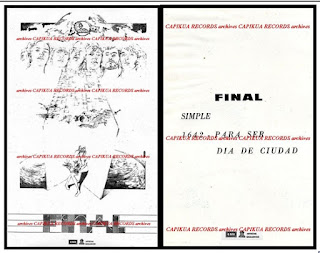II. MEZZANINE Period
realized
that transforming their Folk/Urban songs into
a Progressive Rock genre meant calling in experienced
musicians. For this purpose and advised by a common
friend, composer Daniel Montes, they were introduced
to:
drummer Willy Iturri ( Willy Iturri ), who brought with
him extensive rhythmic resources practiced with Cèsar
Pueyrredon in ‘Banana’, a Pop/Rock group; and
keyboard player Guillermo Medin ( Quistral, Final,
a Progressive Rock genre meant calling in experienced
musicians. For this purpose and advised by a common
friend, composer Daniel Montes, they were introduced
to:
drummer Willy Iturri ( Willy Iturri ), who brought with
him extensive rhythmic resources practiced with Cèsar
Pueyrredon in ‘Banana’, a Pop/Rock group; and
keyboard player Guillermo Medin ( Quistral, Final,
who besides
incorporating the orchestral/arranging crafts-
manship implemented
for Gabriel Ogando in ‘Quistral’
‘Burbujas’,
a Tropical/Dance group.
The formation was completed with Pablo Guyot (G.I.T.)
in lead guitar and Quique Conte (spelling needs confirma-
tion) in bass. Later on, due to Quique’s style discrepancy
with band leaders, he left the group and was replaced by
Carlos Corallo. All tunes were crafted in the basement of
Quique’s aunt house in La Lucila,North Buenos Aires .
‘Final’ was signed to EMI-Odeon in October 1978 and
Consequently, ‘Final’ band contract was ignored by
Magazine Pelo Nº 112, May 1979 interview:
EMI–1642A Format: Single 7" vinyl, 45 RPM
The formation was completed with Pablo Guyot (G.I.T.)
in lead guitar and Quique Conte (spelling needs confirma-
tion) in bass. Later on, due to Quique’s style discrepancy
with band leaders, he left the group and was replaced by
Carlos Corallo. All tunes were crafted in the basement of
Quique’s aunt house in La Lucila,
‘Final’ was signed to EMI-Odeon in October 1978 and
the
contract stipulated the release of an album shortly
afterwards
the ‘Para ser / Dia de ciudad’ single, but
this was
never accomplished due to economical reasons:
adverse
economic measures taken by the Dictatorship’s
minister,
which abruptly reduced consumption, mingled
with the
uncertainty of a possible war with neighbor
Pinochet
regime in Chile
persuaded
the Recording Label to halt the production of
new groups
and reconsider instead substitute releases
of pre-existant signed artists such as Raùl Porchetto.
of pre-existant signed artists such as Raùl Porchetto.
Consequently, ‘Final’ band contract was ignored by
EMI-Odeon
and by the end of 1979 the group members
moved on to
pursue fulfillment of projects on their own.
Magazine Pelo Nº 112, May 1979 interview:
(III. Orchestra Period)
http://www.revistapelo.com.ar/numeros/1979/112/EMI–1642A Format: Single 7" vinyl, 45 RPM
Playback Side A - Final 'Para
Ser'.mp3 (8 MB)
OR
EMI–1642B
Format: Single 7" vinyl, 45 RPM
Playback Side B -
Final 'Dia de Ciudad'.mp3 (6.72 MB)
OR
continued in III.ORCHESTRA Period



